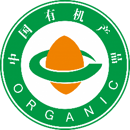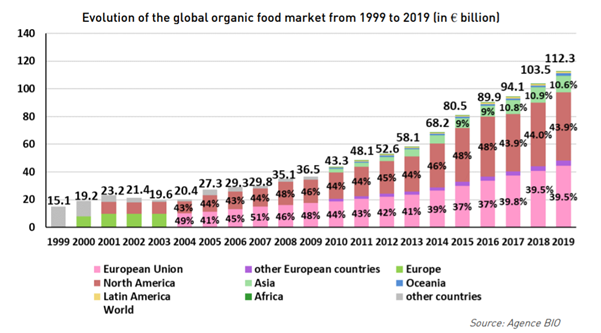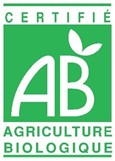In 2020, 16% of new infant formulas launched on the market were organic and, generally speaking, organic sales potential in infant nutrition is confirmed year over year.
ORGANIC in early life nutrition: what are we talking about ?
In France, using organic production and processing methods is an official sign of the quality and origin of a product.
The European regulations that have governed organic farming since 1991 also set very strict rules for the allocation of the European BIO logo.

|
The AB brand Like the European organic logo, the AB certification brand makes it possible to identify 100% organic products or products containing at least 95% organic agricultural products if they are processed products. Its use is optional, but it has the advantage of being recognised by the majority of French people. |
|
In other countries too, the rules for organic products are pretty much the same, particularly in China. However, the Chinese organic certification system does not recognize the European organic certification system. As a result, it is necessary to sell products certified organic in China to certify an entire sector (farming, processing, distribution) by a certifying body accredited in China by the equivalent of the Ministry of Agriculture.

There is also a specific label for Chinese organic products. There is no obligation to apply this label to BtoB products, however BtoC products are mandatory. The use of this logo in colour is mandatory. Details of the procedure for using this logo are included in the GB standard.
Ingredients without synthetic and GMO products
Ingredients used in the manufacture of an ORGANIC infant nutrition product must be produced without the use of synthetic chemicals. GMOs are also ruled out.
Specific production techniques are used and seed varieties are selected for disease resistance.
Respect for animal welfare
The milk used in ORGANIC infant nutrition comes from animals with outdoor access, sufficient space and light and fed with ORGANIC foods.
To avoid the use of antibiotics and drugs, animal health focuses on prevention and breeding.
Healthy and natural products
To obtain an organic infant food, organic product processors focus on maintaining the nutritional qualities of the raw materials. Biological, mechanical and physical methods are therefore preferred over chemical methods:
- no colorants, synthetic chemical aromas or flavor enhancers;
- additives restricted to what is strictly necessary;
- no enrichment of vitamins, minerals and antioxidants, unless required by law;
The organic food market in early life nutrition is growing
According to Agence Bio, the global organic market represented €112 billion in 2019. It is a constantly growing market, which has multiplied by 3 in 10 years and more than 7 in 20 years.

It is a dynamic market in which the EU and the United States remain the leaders with 83% of the market. However, for the past 10 years growth has been driven by Asia, which gains market share each year.
Although it currently accounts for only a small share (5%) of the global organic market, the sale of organic products in early life nutrition has nevertheless been multiplied by 5 in 15 years. (source: Euromonitor Database)
The infant formula market
According to Euromonitor, in 2021, the organic formula market represented €2.8 billion, i.e. 6.3% of the global formula market (€44.7 billion). This market has grown strongly over the past 15 years, with growth multiplied by 16, representing a gain of more than €2.632 billion.
In the coming years, this market will remain buoyant and flourishing. According to forecasts, the organic formula market is even expected to exceed €4.5 billion by 2025.
Moreover, China consumes the most organic infant milk, with the country recording two-thirds of the market share in value and weighing 1.8 billion euros. Europe accounts for 16% of this market.
Why will organic food continue to grow in the early life nutrition market?
Organic products are increasingly popular. In 2021, more than 40% of French, German, Chinese and American consumers say they are influenced by the biological origin of a product when purchasing it. This figure even exceeds 60% in Spain and Thailand. (Source: FMCG Gurus, Clean Label Survey April 2021)
Moreover, more than 60% of consumers say they are willing to pay more for organic products. (Source: FMCG Gurus, Country Profile Survey, May 2021)
The appeal of organic food in early life nutrition is therefore likely to increase, as studies show that consumption of organic products is better for health. According to the in-depth BioNutrinet study, “a higher frequency of consumption of organic foods would be associated with a reduced risk of cancer”.
To meet this demand, Armor Protéines is launching its range of biological ingredients for infant nutrition with Vitalarmor Lactoferrin Organic and Lactarmor DM 90 Organic.
Want to learn more about our products and commitments? Contact us!





